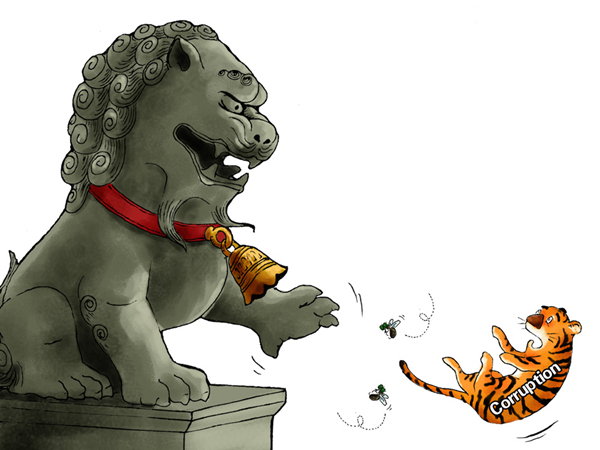China's war on corruption
- By Heiko Khoo
 0 Comment(s)
0 Comment(s) Print
Print E-mail China.org.cn, March 6, 2014
E-mail China.org.cn, March 6, 2014
The leaders of the Communist Party of China (CPC) view the battle against corruption as a struggle of life and death that will determine China's fate. The Party's capacity to control the abuse of power is the defining issue that will shape future relations between the Party and the masses. To avoid the type of collapse that brought down Communist Party rule in the Soviet Union and Eastern Europe, the CPC must stamp out corruption and empower the working masses to create a socialist future.
|
|
|
Shock 'tigers' and awe 'flies' [By Zhai Haijun/China.org.cn] |
Last year, Xi Jinping, general secretary of the CPC Central Committee, vowed that the "color of red China will never change." Strict measures to clean up the behavior of officials were released and enforced, and many displays of official extravagance eradicated. Xi explained, "The Party cadres should be firm followers of Communist ideals, true believers of Marxism and devoted fighters for the socialism with Chinese characteristics." State and Party leaders initiated the campaign by self-criticism and pledged their support for the "mass-line:" to connect as closely as possible with the masses and promote a frugal, honest, hardworking and clean government.
Xi explained that an understanding of revolutionary history is the "best nutrient" for Party members. In Mao Zedong's time, China's revolutionaries and state functionaries were known worldwide for their Spartanic lifestyles and their closeness to the masses. Wage inequality was minimal and a collectivist spirit pervaded society. This anchored communist ethics deep in the minds of workers and peasants. So, even when catastrophic policy errors occurred, the Party could draw on deep wells of social support. The people and Party believed they were transforming China, and that the world was moving towards a communist future.
Deng Xiaoping's policies permitted markets, foreign investment and indigenous private ownership. This provided access to foreign capital and technology and actually developed indigenous capital: generating the most rapid modernization -- as well as economic growth and reduction in poverty -- of any major economy in world history. This happened because the CPC retained its control over the macro economy by means of the public ownership of the banks and the commanding heights of the economy.
However, the accompanying rise in inequality produced grotesque disparities in life styles and opportunities. Urban life in China appeared to become similar to that of many developing capitalist countries: beggars and billionaires pass each other in the country's great cities; capitalists in Ferraris race past migrant workers who build five star hotels on poverty wages. However, in the minds of broad layers of the working classes, capitalism is associated with technical advance and dynamic development. The working class has become China's largest social class. Workers with urban registration have adjusted to new forms of global, private and state capital investment, as well as to new types of employment. Migrant workers have been drawn into the global chain of production and consumption.







Go to Forum >>0 Comment(s)